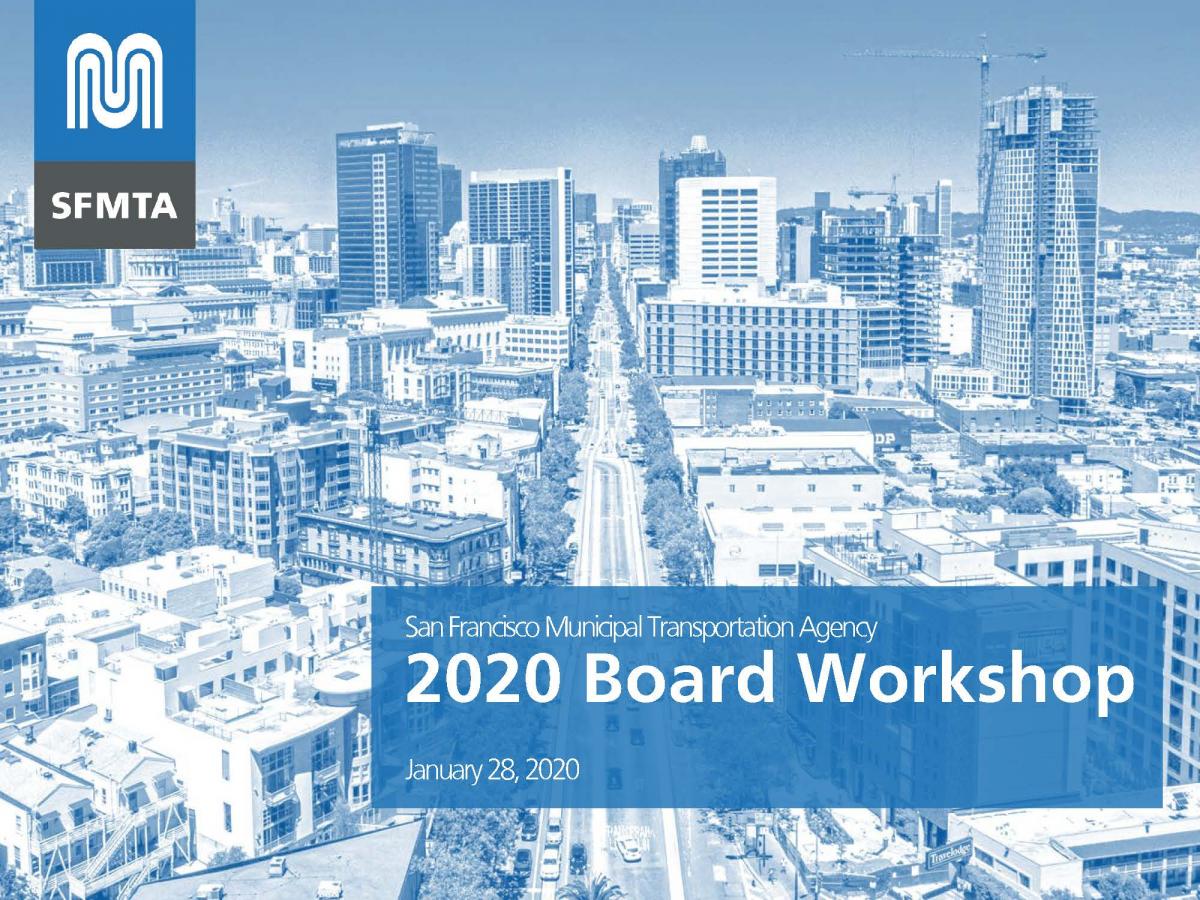By Bradley Dunn

Last Tuesday the SFMTA Board of Directors held their annual workshop, a special meeting that allows staff and the board to work together on larger issues. This year the workshop focused on our upcoming two-year budget. Our budget reflects the values of the agency, prioritizes investments in our transportation system and helps define our work over the next two years.
The city's booming economy and housing policies have created challenges for our transportation sector. Those challenges are reflected in the SFMTA's failure to meet safety, ridership and congestion goals. The good news is we also know that where we invest, we see safer streets and higher bike and transit use. For the years ahead, we have ambitious plans to keep investing, innovating, and meeting these challenges.
You can watch the board workshop to see how the agency plans for the future and incorporates policy guidance from our board and the public.
Below is a synopsis of some of the key topics which will help you navigate to areas of interest. Each section includes a link to the related video and a full video playlist is also included.
- San Francisco's transportation sector is struggling across key indicators – safety, ridership and congestion
- This agency, however, understands the solutions. Where the SFMTA invests we see safer streets, better transit, and higher ridership
- We understand the root of the problem, including job growth, traffic speeds and housing needs
- Sustainable trips are down as a percentage of mode share
- Ridership is up on transit routes improved via Muni Forward
- Consistent customer frustrations with safety; transit wait times, crowding and reliability; traffic congestion; and overall service by the agency
- These challenges are known and understood by the agency and require systematic changes
- FY 2021-2022 budget addresses issues across the agency
- Our financial objectives are financial sustainability (on-going) and economic resiliency (disruption)
- Structural imbalance exists between on-going sustainable revenues and growing expenses
- Agency must move from a reactive culture and a preventative one
- For the first time, the agency integrated asset management data and analysis into the development of the FY 2022 budget and FY 2025 Capital Improvement Program
- Progress made toward the strategic action plan in 2019, including 9 quick-build projects, the legislating of Market Street's closure to general vehicle use, and more
- Proposal to use TNC tax: 50 percent for more quick-build projects and 50 percent for signal hardware upgrades
- $1.2 million annual request for consistent educational program funding, focused on behavior change
- Plans to harden security at SFMTA facilities
- Work will include repairing fences, gates and exterior doors, trimming trees and shrubs to increase visibility, and installing floodlights to increase visibility outside the buildings near the alleys or dark street corners.
- Proposal to expand the Muni Transit Assistance Program (MTAP)
- Request for 12 new positions to increase training and support for Transit staff
- Propose increased supervision staffing to build a service-oriented work culture, improve training and create an oversight team
- Request for new planner and communication positions, rail and subway maintenance, and other positions and capital improvements
- Launch new customer information system
Managing Congestion and Demand
- Proposal to upgrade parking meter hours to 10 p.m., at lower rates, as well as green and white zones
- Expansion will be based on engagement with District Supervisors and local merchants, evaluated, and potentially expanded to other areas if deemed successful
- Also proposing 44 parking control officers to support multimodal safety and traffic flow
- Fare revenues are down, and there are concerns about access to Clipper Card add-value locations and other discounted fare programs
- New fare policies could include a day pass for purchase at the fare box, monthly fare capping and other benefits through Muni Mobile
- Board could also consider pausing fare indexing, reducing Clipper fare differential 50 percent ($0.25), expanding free youth program to all kids, introducing a City College annual pass
- Proposing a 6 – 6.5 percent service expansion by end of the fiscal year 2022
Improving Hiring/Talent Acquisition
- Agency has only 1 HR analyst per 118 vacancies
- Talent acquisition critical to achieving the agency's goals
- Goal to hire 525 operators in 2020-2021
- Half of the agency staff are satisfied with their job
- New positions proposed to focus on racial equity, social equity, and inclusion
2021-2022 Operation and Capital Budget – 2021-2025 Capital Improvement Program
- Projected operating gap of $66 million in 2021 and $77 million in 2022
- Muni Working Group and other proposal sets add significantly to the gap
- Revenue options include meter modernization and fare changes
Published February 11, 2020 at 04:23AM
https://ift.tt/2OJXZbn
Comments
Post a Comment
If you have any doubt's, please let me know